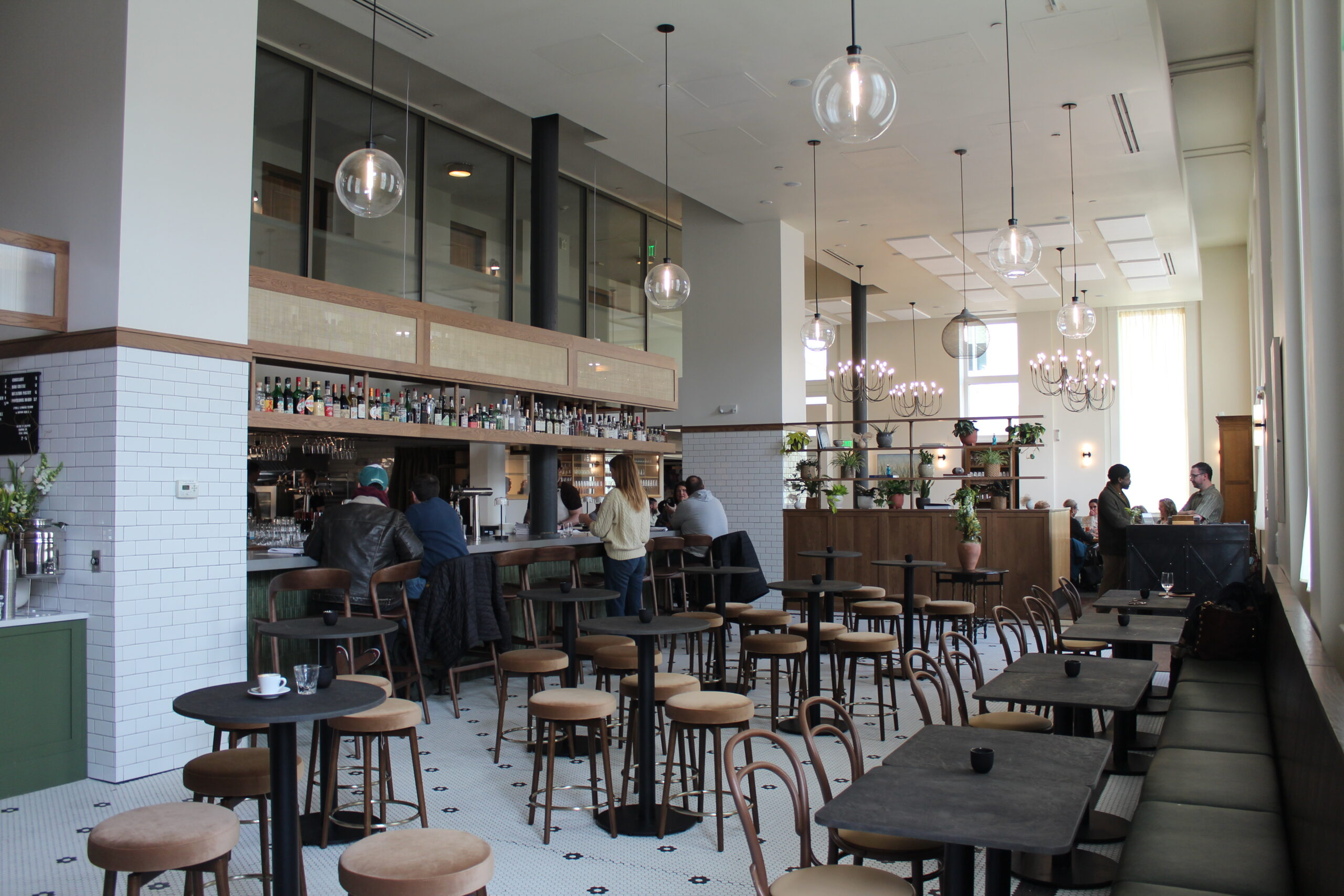
Chef Alex Seidel stands inside Mercantile last week. (Max Scheinblum/BusinessDen)
Last Wednesday, Alex Seidel, the James Beard Award-winning chef, reopened Mercantile after a six-week, roughly $500,000 renovation.
The 5,000-square-foot space at Union Station features a revamped bar and cafe space, expanded private dining and a new menu.
And Seidel, who opened the restaurant in 2014, is focusing more on what he loves. The restaurateur, who sold his majority stake in the restaurant to Sage Hospitality in August, will spend more time in the kitchen.
The chef, 52, still owns 35% of the eatery and said Mercantile is the first independent restaurant owned by Sage, which runs other Union Station spots and Denver hotels.
“(Sage) provides a lot of resources in the day-to-day operations and really has allowed me an opportunity to just focus on the things that I think I’m better at,” he said, noting talks started with Sage CEO Walter Isenberg about two years ago. “I’m not good at P&Ls. I’m not good at HR. I’m not good at the newest regulations coming down from the state or the city. I’ve been a cook my whole life, so I think I do my best work in the kitchen.”
Mercantile 1.0, as he called it, was a more market-oriented concept, with cheese, produce and meat coming from Seidel’s farm in Larkspur that he sold in 2021. Mercantile 2.0 is an update on that, still using local purveyors such as Rebel Farms and Brunson Meat Co., with a menu that will change seasonally four times a year.
Seidel also said Mercantile expanded its lunch operations to offer both counter service and a $35, two-course meal on its sit-down side. The spot also now has a private dining room that can fit 10 people.

The renovated interior of Mercantile. (Max Scheinblum/BusinessDen)
He and Executive Chef Alex Grenier, who came on staff about a year ago, used the six-week closure to tune up the menu — something that isn’t always practical in a breakneck industry.
“We tasted every single dish multiple times, which sometimes you don’t even get an opportunity to do. You make a dish and you put it out on the menu,” Seidel said. “Here we were able to sit down, and we were able to go through each dish, go through each component, make sure that the textures work together, make sure that the flavors work together, make sure that the presentation was beautiful and consistent.”
Seidel said they spoke to all of Mercantile’s vendors and renegotiated prices. They added new proteins such as rabbit and mussels while increasing the amount of vegetables used because they are typically cheaper than meats.
He said Mercantile didn’t raise menu prices and has reverted to a traditional tip pool instead of the 20% service charge his concepts had used since 2020.

Mercantile’s previous look. (Courtesy Kelly Calvillo)
“For this particular space it didn’t work anymore,” he said of the blanket fee. “It’s a very large space, and when you have a very large space with not quite the revenue that you’re hoping to have, your labor percentage goes up. … If you’re busy, that can be mitigated. But quite honestly we weren’t that busy.”
Pre-COVID-19, Seidel said, Mercantile had 110 employees and $6 million in annual revenue. Those numbers now sit at 40 staff and $3 million in sales.
Sage’s purchase of 65% of the business gave it a lifeline, Seidel said.
“I’m glad we made it to 10 years, and I’m glad that we’re still here,” he said. “And if it wasn’t for Sage, we probably wouldn’t still be here.”
On closing Fruition: ‘I wasn’t having fun’
Seidel also closed his Fruition restaurant last month.
“It wasn’t too much to do with business or economics,” he said, though he noted his health insurance costs increased 35% over the past year.
“But I think for me, this has been more of a personal journey. I wasn’t having fun worrying about what new legislation was going to come out. I don’t have fun going to the mayor’s office and talking about business,” he said. “I like to be in my restaurant working with my people and creating things. That’s when I’m having fun. And I got so far away from that.”
Selling his farm was the first step, then came downsizing his stake in Mercantile and, ultimately, closing his first restaurant. He opened the 1,400-square-foot spot in 2007.
“I didn’t have the ability to just focus my management in that one space, and we had a hard time managing our numbers there,” he said of Fruition. “Our labor cost was (up) over 60%. Our food cost was (up) over 40%.”
Along with Mercantile, Seidel also has three Chook Chicken locations and Fudmill, a bakery in Clayton. He said the other concepts are doing relatively well, but they’re not back to pre-pandemic levels.
He said that Fruition’s sales were consistently around $2 million a year, both pre- and post-pandemic, not accounting for the service fee.
Seidel said about 12 years are left on Fruition’s lease and he’s looking for someone to fill the space, although he’s turned down some offers.
“It’s really important to me to make sure with the person that goes in there or the people that go in there, I can have full confidence that they’re going to carry on the legacy of that place and be an amenity to the neighborhood,” he said.
On the industry: ‘I don’t ever remember it being this difficult’
A 37-year career in restaurants has taken a toll on Seidel. He’s had five surgeries on his feet and back in the past five years.
Even without the health challenges, though, the Wisconsin native said now is the hardest it’s ever been to be in the food industry.
“I don’t ever remember it being this difficult,” he said. “Not just to manage the business but to manage the restaurant in its entirety. From how you manage people to how you manage the bottom line.”
“There’s a lot more regulation that restaurants have to follow (now), and it pretty much started with ‘Obamacare,’ like requiring businesses to contribute to health insurance, which I think is amazing. I was very proud to do it. I think I went above and beyond what the minimum requirements ever were,” he said. “But every year something new came. And, again, all good ideas, but how do you implement those ideas so it works for everybody? And it obviously hasn’t worked for restaurants.”
He recalled a meeting with former Denver Councilwoman Robin Kneich six years ago. Kneich was the prime sponsor of an ordinance that kicked off minimum wage hikes in 2019.
Seidel said he met with her to discuss many of the same points made around wages and restaurants today. He said it ended up being “very cold” and “very combative.”
“I was trying to become familiar with my city as a young chef, as a young entrepreneur, trying to understand behind the scenes of what happens in our city between our businesses. And I didn’t get a very good reaction as soon as I sat down,” he said. “Everything that we had to say back then about (the hike) going to be a restaurant-killer fell on deaf ears.”
He said the majority of conversations he’s had with politicians since have been similar, especially when talking about a recently introduced bill in the statehouse that would increase the offset of $3.02 per hour between tipped and non-tipped employees.
“Anytime you talk to them about a struggling business, their immediate reaction is, ‘So you’re going to take away from the employee?’ instead of trying to understand if there’s no business, there is no employee,” Seidel said. “We’re in this together.”
Two months ago, however, a meeting with Mayor Mike Johnston was a “180-degree difference.”
Seidel, along with Isenberg, Juan Padro of Culinary Creative Group, and Troy Guard of TAG Restaurant Group discussed Denver’s restaurant climate.
“I was sharing the perils of what has been happening in the restaurant industry. I was sharing with him that Fruition was about to close. … I would say that meeting was a make-or-break moment,” he said, noting that the aforementioned bill was a positive to come out of that.
“Is it the end-all be-all? Is it going to fix everything? No, it’s not,” he said of the legislation. “There’s going to have to be some other things that are done. But at least it is a starting point.”

Chef Alex Seidel stands inside Mercantile last week. (Max Scheinblum/BusinessDen)
Last Wednesday, Alex Seidel, the James Beard Award-winning chef, reopened Mercantile after a six-week, roughly $500,000 renovation.
The 5,000-square-foot space at Union Station features a revamped bar and cafe space, expanded private dining and a new menu.
And Seidel, who opened the restaurant in 2014, is focusing more on what he loves. The restaurateur, who sold his majority stake in the restaurant to Sage Hospitality in August, will spend more time in the kitchen.
The chef, 52, still owns 35% of the eatery and said Mercantile is the first independent restaurant owned by Sage, which runs other Union Station spots and Denver hotels.
“(Sage) provides a lot of resources in the day-to-day operations and really has allowed me an opportunity to just focus on the things that I think I’m better at,” he said, noting talks started with Sage CEO Walter Isenberg about two years ago. “I’m not good at P&Ls. I’m not good at HR. I’m not good at the newest regulations coming down from the state or the city. I’ve been a cook my whole life, so I think I do my best work in the kitchen.”
Mercantile 1.0, as he called it, was a more market-oriented concept, with cheese, produce and meat coming from Seidel’s farm in Larkspur that he sold in 2021. Mercantile 2.0 is an update on that, still using local purveyors such as Rebel Farms and Brunson Meat Co., with a menu that will change seasonally four times a year.
Seidel also said Mercantile expanded its lunch operations to offer both counter service and a $35, two-course meal on its sit-down side. The spot also now has a private dining room that can fit 10 people.

The renovated interior of Mercantile. (Max Scheinblum/BusinessDen)
He and Executive Chef Alex Grenier, who came on staff about a year ago, used the six-week closure to tune up the menu — something that isn’t always practical in a breakneck industry.
“We tasted every single dish multiple times, which sometimes you don’t even get an opportunity to do. You make a dish and you put it out on the menu,” Seidel said. “Here we were able to sit down, and we were able to go through each dish, go through each component, make sure that the textures work together, make sure that the flavors work together, make sure that the presentation was beautiful and consistent.”
Seidel said they spoke to all of Mercantile’s vendors and renegotiated prices. They added new proteins such as rabbit and mussels while increasing the amount of vegetables used because they are typically cheaper than meats.
He said Mercantile didn’t raise menu prices and has reverted to a traditional tip pool instead of the 20% service charge his concepts had used since 2020.

Mercantile’s previous look. (Courtesy Kelly Calvillo)
“For this particular space it didn’t work anymore,” he said of the blanket fee. “It’s a very large space, and when you have a very large space with not quite the revenue that you’re hoping to have, your labor percentage goes up. … If you’re busy, that can be mitigated. But quite honestly we weren’t that busy.”
Pre-COVID-19, Seidel said, Mercantile had 110 employees and $6 million in annual revenue. Those numbers now sit at 40 staff and $3 million in sales.
Sage’s purchase of 65% of the business gave it a lifeline, Seidel said.
“I’m glad we made it to 10 years, and I’m glad that we’re still here,” he said. “And if it wasn’t for Sage, we probably wouldn’t still be here.”
On closing Fruition: ‘I wasn’t having fun’
Seidel also closed his Fruition restaurant last month.
“It wasn’t too much to do with business or economics,” he said, though he noted his health insurance costs increased 35% over the past year.
“But I think for me, this has been more of a personal journey. I wasn’t having fun worrying about what new legislation was going to come out. I don’t have fun going to the mayor’s office and talking about business,” he said. “I like to be in my restaurant working with my people and creating things. That’s when I’m having fun. And I got so far away from that.”
Selling his farm was the first step, then came downsizing his stake in Mercantile and, ultimately, closing his first restaurant. He opened the 1,400-square-foot spot in 2007.
“I didn’t have the ability to just focus my management in that one space, and we had a hard time managing our numbers there,” he said of Fruition. “Our labor cost was (up) over 60%. Our food cost was (up) over 40%.”
Along with Mercantile, Seidel also has three Chook Chicken locations and Fudmill, a bakery in Clayton. He said the other concepts are doing relatively well, but they’re not back to pre-pandemic levels.
He said that Fruition’s sales were consistently around $2 million a year, both pre- and post-pandemic, not accounting for the service fee.
Seidel said about 12 years are left on Fruition’s lease and he’s looking for someone to fill the space, although he’s turned down some offers.
“It’s really important to me to make sure with the person that goes in there or the people that go in there, I can have full confidence that they’re going to carry on the legacy of that place and be an amenity to the neighborhood,” he said.
On the industry: ‘I don’t ever remember it being this difficult’
A 37-year career in restaurants has taken a toll on Seidel. He’s had five surgeries on his feet and back in the past five years.
Even without the health challenges, though, the Wisconsin native said now is the hardest it’s ever been to be in the food industry.
“I don’t ever remember it being this difficult,” he said. “Not just to manage the business but to manage the restaurant in its entirety. From how you manage people to how you manage the bottom line.”
“There’s a lot more regulation that restaurants have to follow (now), and it pretty much started with ‘Obamacare,’ like requiring businesses to contribute to health insurance, which I think is amazing. I was very proud to do it. I think I went above and beyond what the minimum requirements ever were,” he said. “But every year something new came. And, again, all good ideas, but how do you implement those ideas so it works for everybody? And it obviously hasn’t worked for restaurants.”
He recalled a meeting with former Denver Councilwoman Robin Kneich six years ago. Kneich was the prime sponsor of an ordinance that kicked off minimum wage hikes in 2019.
Seidel said he met with her to discuss many of the same points made around wages and restaurants today. He said it ended up being “very cold” and “very combative.”
“I was trying to become familiar with my city as a young chef, as a young entrepreneur, trying to understand behind the scenes of what happens in our city between our businesses. And I didn’t get a very good reaction as soon as I sat down,” he said. “Everything that we had to say back then about (the hike) going to be a restaurant-killer fell on deaf ears.”
He said the majority of conversations he’s had with politicians since have been similar, especially when talking about a recently introduced bill in the statehouse that would increase the offset of $3.02 per hour between tipped and non-tipped employees.
“Anytime you talk to them about a struggling business, their immediate reaction is, ‘So you’re going to take away from the employee?’ instead of trying to understand if there’s no business, there is no employee,” Seidel said. “We’re in this together.”
Two months ago, however, a meeting with Mayor Mike Johnston was a “180-degree difference.”
Seidel, along with Isenberg, Juan Padro of Culinary Creative Group, and Troy Guard of TAG Restaurant Group discussed Denver’s restaurant climate.
“I was sharing the perils of what has been happening in the restaurant industry. I was sharing with him that Fruition was about to close. … I would say that meeting was a make-or-break moment,” he said, noting that the aforementioned bill was a positive to come out of that.
“Is it the end-all be-all? Is it going to fix everything? No, it’s not,” he said of the legislation. “There’s going to have to be some other things that are done. But at least it is a starting point.”


